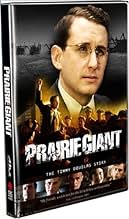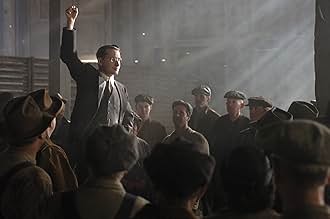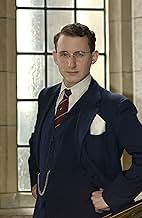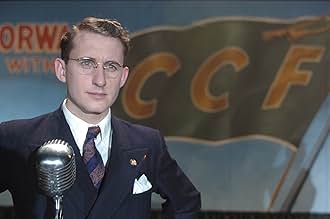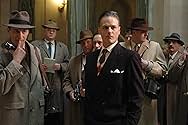A mini-series based on the work of Canadian political icon Tommy Douglas.A mini-series based on the work of Canadian political icon Tommy Douglas.A mini-series based on the work of Canadian political icon Tommy Douglas.
- Awards
- 2 wins & 10 nominations total
Browse episodes
Featured reviews
Very interesting movie in 2-parts about Tommy Douglas. He's the father of medicare in Canada, but so much more. This mini-series (4 hours total) tells the story of a great Canadian. In fact, he was voted the greatest Canadian by the citizens of this country a couple of years ago. Unfortunately, his work and accomplishments are not well enough known by ordinary Canadians. That's why this mini-series is so important. It helps that Michael Therriault is doing a terrific job as T.C. Douglas. It helps also that the supporting cast is great. And the use of archives adds on to the story. Too bad though that the mini-series focuses almost entirely on the creation of medicare. A longer series was perhaps needed.
Seen at home, in Toronto, on March 12th and 13th, 2006.
81/100 (***)
Seen at home, in Toronto, on March 12th and 13th, 2006.
81/100 (***)
10ram-30
One might expect a mini series over 3 hours about the father of Medicare would be full of fillers but they would be mistaken. The life of T.C. Douglas goes by very quickly in this movie yet manages to cover much of his major accomplishments, personal highlights, and famous speeches. Tommy Douglas was first and foremost a great orator. His experience as a Baptist pastor honed his public speaking skills and also his moral commitment to his promises. "PRAIRIE GIANT" shows the extent of his persecution both religious ("The trouble with you Baptists is they don't hold you under the water long enough") and political (his C.C.F. party is referred to as Communists and the Red Menace). His accomplishments can best be viewed on related web pages and publications. The biopic wisely focuses on his personal life which in large part shaped his social attitudes. The music and cinematography are a big part of this film but Canadian films about the Depression and mid 20th Century have always been of high quality. The acting is also as good as anticipated. Many famous faces have yet to be posted on the IMDb list. For example, Nicholas Campbell (the star reporter on Ron Howard's Cinderella MAN for those of you who haven't seen DAVINCI'S INQUEST)plays Liberal E.J.Young, CODCO's Andy Jones plays P.M. MacKenzie King, and Aidan Devine (Gordie Howe on NET WORTH) plays M.J. Colewell. Of course, it would not seem like a Canadian biopic without R.H.Thompson who's been in docu-dramas about other Canadian heroes like Ken Taylor, Terry Fox, Ted Lindsay, Frederick Banting, and Pierre Trudeau. The producers really pulled out all the stops to make a movie that will live as long as the memory of T.C. Douglas lives on.
I was upset to see that this movie did not give credit where credit is due. That is, Matthew Anderson was not named as co-creator of the health care system in Canada. Matt Anderson took a small step for his rural municipality of McKillop which became a giant leap for our nation.
In 1939, at the provocation of Matt Anderson of Regional Municipality McKillop, the Municipal and Medical Hospital Services Act was enacted, allowing municipalities to levy a personal tax to finance medical services. When the CCF government came to power in 1944, their platform called for comprehensive health insurance. The Hospital Insurance Act came into effect on January 1, 1947, ensuring every citizen of the province hospital care without a charge. Tommy Douglas insisted on a small annual premium to help finance this insurance. The introduction of hospital insurance in Saskatchewan paved the way for the introduction of medical insurance.
I encourage you to do an internet search for Matt Anderson of Bulyea, Saskatchewan to discover why he should be known as the "Grandfather of Medicare" in Canada.
In 1939, at the provocation of Matt Anderson of Regional Municipality McKillop, the Municipal and Medical Hospital Services Act was enacted, allowing municipalities to levy a personal tax to finance medical services. When the CCF government came to power in 1944, their platform called for comprehensive health insurance. The Hospital Insurance Act came into effect on January 1, 1947, ensuring every citizen of the province hospital care without a charge. Tommy Douglas insisted on a small annual premium to help finance this insurance. The introduction of hospital insurance in Saskatchewan paved the way for the introduction of medical insurance.
I encourage you to do an internet search for Matt Anderson of Bulyea, Saskatchewan to discover why he should be known as the "Grandfather of Medicare" in Canada.
9dm88
"Prairie Giant" is a very good film about the great Canadian social democrat Tommy Douglas, the creator of the first Medicare system in North America, along with the first provincial government leader to sign into law a bill of rights and to legally guarantee collective bargaining in all sectors of the economy. Douglas was a witty and clever speaker, and Theriault does a good job at conveying his oratorical skills. The usual minuscule CBC budgets aren't noticeable here. A few of the minor actors don't seem terribly well cast: Paul Gross as Diefenbaker, Andy Jones as Mackenzie King, though they give it the old college try. Yet Don McKellar is good as Saskatchewan's finance minister, as is Kristin Booth as Irma Douglas, Tommy's wife. Douglas' final speech to the 50th Anniversary meeting of the CCF about the greed of private enterprise still rings true today in our globalized, McDonaldized, corporatized world.
It would have been nice to see the political struggles of the late 1960s and 1970s, which were skipped over the film, but these were sacrificed to show the struggle over Medicare in detail. You might have thought this would be a somewhat dull three hours... yet it could easily have filled five hours and kept my attention. We need more films like this from the CBC.
It would have been nice to see the political struggles of the late 1960s and 1970s, which were skipped over the film, but these were sacrificed to show the struggle over Medicare in detail. You might have thought this would be a somewhat dull three hours... yet it could easily have filled five hours and kept my attention. We need more films like this from the CBC.
The film is shamelessly emotional and still pulls it off, because the material is strong. By no means perfect. It sneaks up on you and is, at times, a full-on, hanky-worthy tear jerker. My most cynical friends reluctantly admitted they cried their eyes out. How often do you get to say that about a 4-hour CBC biopic? Far beyond the film, Tommy's worth a ten on his own merits. (So I can only give it a nine.) He is unquestionably a hero of the left, but he is also a hero for anyone who believes in balanced budgets and debt reduction.
Scratch that. Debt elimination.
He's a hero for anyone who thinks politicians should campaign on what they intend to do, and then do what they campaigned on. He's a hero for anyone who thinks government ought to be transparent and accountable. He actually managed to deliver ambitious yet ruthlessly efficient government service. Sometimes government is the problem. Not this time. This time government was transformative.
Like John Diefenbaker and John A. MacDonald, he is a man who changed his country beyond any reasonable expectation.
How the hell do you turn that into a series of compelling scenes with even remotely engaging characters? Good luck.
And yet the movie is so much better than you think it is. Especially the second part, which by all rights should flounder and die like a baby seal in a Greenpeace ad. But it creeps up on you until it absolutely soars. Look at the person beside you. One of you is probably going to cry.
Politics? Emotional? Inspiring? This Baptist preacher from the 30's is, in the end, shockingly relevant? Who woulda thunk? Not that I would pretend to be objective.
Scratch that. Debt elimination.
He's a hero for anyone who thinks politicians should campaign on what they intend to do, and then do what they campaigned on. He's a hero for anyone who thinks government ought to be transparent and accountable. He actually managed to deliver ambitious yet ruthlessly efficient government service. Sometimes government is the problem. Not this time. This time government was transformative.
Like John Diefenbaker and John A. MacDonald, he is a man who changed his country beyond any reasonable expectation.
How the hell do you turn that into a series of compelling scenes with even remotely engaging characters? Good luck.
And yet the movie is so much better than you think it is. Especially the second part, which by all rights should flounder and die like a baby seal in a Greenpeace ad. But it creeps up on you until it absolutely soars. Look at the person beside you. One of you is probably going to cry.
Politics? Emotional? Inspiring? This Baptist preacher from the 30's is, in the end, shockingly relevant? Who woulda thunk? Not that I would pretend to be objective.
Did you know
- TriviaThe wolf from Paul Gross's series Due South, Diefenbaker, was named after John G. Diefenbaker, who was Canada's 13th Prime Minister, which is the role played here by Gross.
- GoofsIn Tommy Douglas's first election campaign in the 1930s, he is shown using his famous Mouseland speech. In reality, that speech was first given in 1961.
- Quotes
Tommy Douglas: My friends, watch out for the little fellow with an idea.
- ConnectionsReferenced in Corner Gas: Bend It Like Brent (2008)
Details
- Release date
- Country of origin
- Official sites
- Language
- Also known as
- Povestea lui Tommy Douglas
- Filming locations
- Production company
- See more company credits at IMDbPro
- Color
- Aspect ratio
- 1.78 : 1
Contribute to this page
Suggest an edit or add missing content


